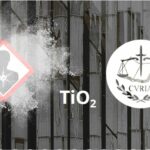
Titanium dioxide nanoparticles: exposure limits to avoid occupational cancers
.
.
.
04/03/2021
With 17,000 tons produced or imported each year in France (according to industry declarations), titanium dioxide in nanoparticulate form is one of the most widely used nanomaterials in various industrial sectors: paints, glass, cosmetics, plastics, textiles, etc.
Many workers are therefore exposed to it, with a risk of pulmonary inflammation that can lead to the development of cancers.
The French National Agency for Health Safety (Anses) publishes today its recommendations for occupational exposure limit values (OELV ) to reinforce risk prevention for workers exposed to TiO2 nanoparticles by inhalation: OELV-8h of 0.80 µg/m3 and an estimated STELV-15 min of 4 µg/m3.
Other news on the topic
Upcoming Nano Agenda
27
Jan.
2026

Nanotechnologies and agriculture: a reference framework for responsible practice (AFNOR, online)
On line
Webinar
- Webconference for analysis laboratories, plant fertilizer manufacturers and distributors, public authorities…
- Moderated by David Krupka, nanotechnologies development manager at AFNOR Normalisation and Emilie Langlois-Bertrand, nantechnologies standardization project manager.
- In partnership with Armand Masion, CNRS Research Director, and Sandrine Mocoeur, Health, Safety, Environment and Quality Manager at SYNGENTA.
- This exchange will also be an opportunity to explore the creation of a national platform to identify standardization needs.
- Website: www.afnor.org/evenement/nanotechnologies-agriculture-cadre-pratique-responsable/
2
Fév.
2026


Bridging innovation and safety: frameworks and methodologies for nanomaterials and nano-enabled applications (OECD, online)
On line
Webinar
- The webinar will present an overview of the key findings of the OECD report on safe and sustainable by design tools, integrative systems and platforms for nanomaterials and nano-enabled products and on its perspectives on how SSbD tools and systems can be applied in practice to support decision making, innovation and regulatory preparedness for nanomaterials and nano-enabled products.
- Organizer: OECD
- Website: https://meetoecd1.zoom.us/webinar/…
16
Mars
2026

Metallic nano-objects (MNO 2026, Bordeaux – France)
Bordeaux
Conference
- International conference on metallic nano-objects for experts working in the interdisciplinary field of metallic nanoparticles, with a particular emphasis on nanoparticle synthesis and characterization, plasmonics, optics and photonics, catalysis, biomedicine, electronics, and nanoparticle recycling
- Organizers / Partners: CNRS, Bordeaux University, Bordeaux INP, ICMCB, CRPP, CBMN, ISM
- Website: https://mno2026.sciencesconf.org



